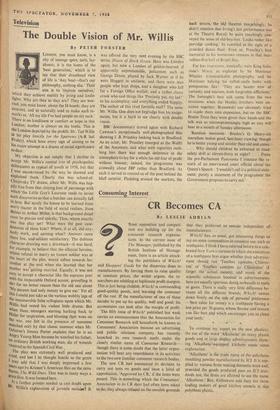itself. There is the initial certainty—`I'm going to bring her
back and leave my wife' : the mount- ing uneasiness—'What will the firm say?' : love for his children, recollected love and acknowledged hatred for his wife : the vision of
Norman Gear is operating on the lunatic fringe. In his first novel, Gertie's Golden Days, he moved on the outer borders, but now, with The House of Ruby Wogan, his feet are firmer and he has stepped several paces nearer the snake-pit which lies at the centre of his chosen arena. Ruby Wogan is a boarding-house keeper who collects oddities—a sex-batty evangelist, a blood-batty moron, a stage-batty lavatory man, et al. Since Ruby herself is also a trifle odd, the goings-on are horrendous; and into this mental underworld comes the gawky adolescent hero, who is not quite sure whether he is batty or not, who wonders whether to accept Ruby's house as a grateful refuge for his abnormality or to strike away and seek sanity in a sane world. This situation is nicely posited, the developments are swift, the denoue- ment exciting. But for all he has chosen such an obviously noisy subject, one does wish Mr. Gear would make less noise. Otherwise, the banging and slamming and bumping will end by pro- pelling himself and his readers headlong into the snake-pit which he has just—so far—avoided. Sigh, for a Strange Land brings refugees from behind • the Curtain to civilisation. It pleases, at first, by avoiding mawkishness, by being practical and funny in a very intelligent way. But once the refugees reach civilisation, then civilisation's representatives spoil everything by displaying all the mawkishness, disguised as 'understanding' and evidently approved by the novelist herself, which the refugees have so blessedly eschewed. In conclusion, I recommend Love and the Love- less for its interesting account of mercifully out- moded military processes—such as preparing horse-lines or mounting, mass frontal attacks
`somewhere in France.' SIMON RAVEN
Boy and 13uflalo by Lt 10o-fun
Post this coupon now . . .
and receive these charming pictures with your first number of this journal direct from Peking! Offer available to all subs. received before Dec. 3r, x358
L
share. Naturally more and more people' will buy equity shares as they become better acquainted with the working of the capitalist Welfare State and yearn to par- ticipate in its growth. It is right and proper that they should do so. In America men and women form investment clubs for the joint purchase of equities and will meet even weekly to debate the respective merits of their holdings and decide on what should be bbught or sold. The thirst for knowledge goes happily hand in hand with the desire for capital gain. I can imagine a club arguing fiercely about a switch from General Motors to American Motors and resolving in the end to do more research into consumer reactions to the latest 'depth' advertis- ing. The better invested it is, the more enlightened its members become. What a change it would make in our own ignorant society if the average worker were more interested in the fortunes of equity shares than in the pools!
Leaving aside the growth of popular investment in ordinary shares, the increase in institutional equity investment has been due mainly to the growth of pension funds. The managers of pension funds have wisely decided that it is essential to have a fairly large proportion of their portfolio invested in ordinary shares as a hedge against the fall in the real value of money, but there has been no headlong flight from fixed-interest securities. When our inflation was raging in 1957 there was it good deal of comment on the decision of Lloyd's to allow their underwriters to invest half their deposits in equity shares, but the Council of Lloyd's was merely following, rather belatedly, the lead of the Church of England Commissioners and bringing itself up to date in investment practice. If there had been a wholesale flight from fixed- interest securities, it would have been noticeable in life assurance accounts, but the average equity investment of the life fund is still under 20 per cent. of the total. After all, an insurance contract is a money contract and the life company is under no obligation to protect its policy-holders against a rise in domestic prices, except in so far as those holding 'with profit' policies expect to enjoy rising bonuses.
By NICHOLAS DAVENPORT


































 Previous page
Previous page